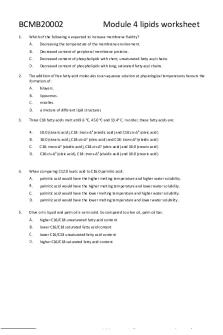Digital Disconnect Worksheet with Answers PDF

| Title | Digital Disconnect Worksheet with Answers |
|---|---|
| Course | Introduction To Media Studies |
| Institution | University of California Riverside |
| Pages | 2 |
| File Size | 87.7 KB |
| File Type | |
| Total Downloads | 83 |
| Total Views | 169 |
Summary
Digital Disconnect film questions and answers...
Description
Digital Disconnect Worksheet + Answers [1] According to Robert McChesney, popular culture in the 1960s and 1970s contained many examples of computers causing major Anxiety [2] Early on in the documentary, viewers are shown a clip from the 1968 Stanley Kubrick film, 2001: Space Odyssey . [3] According to McChesney, during the third quarter of Super Bowl XVIII in January 1984, a revolutionary commercial for Apple Computer aired. [4] That Super Bowl commercial was directed by Ridley Scott . [5] How many people, according to the documentary, were online in 1995? 10 Million [6] According to what McChesney notes in the documentary, approximately how many people are online today? 3.5 Billion People. [7] McChesney states in the documentary that “on Youtube alone, the amount of video being uploaded is the equivalent of roughly 180,000 feature length movies a week,” more than all the film and TV programs Hollywood as ever produced. [8] The dominant debate between skeptics and celebrants regarding the democratic power of the Internet is interesting, McChesney admits, but he suggests it also does not go far enough because it leaves out what crucial factor pertaining to the Internet and democracy? It leaves out the role the economic system has had in shaping the internet. [9] What does McChesney refer to when he invokes the term “American catechism”? That capitalism operates without any regard for democracy. There is no real correlation between capitalism and democracy. [10] McChesney argues that within “democratic societies,” like the United States, “capitalism and democracy – far from being a harmonious coupling – are very often at odds with each other.” What is one reason he offers to explain that tension? He says class divides and inequality are built into the structure of the capitalist system. [11] Does McChesney claim that the Internet has challenged monopoly power or that it has helped generate monopolistic control? The internet has helped generate monopolistic powers like Apple and Amazon. [12] According to the documentary, what was the name of the government-funded experimental networking project, started in 1969, that would prove to be the precursor to the Internet? ARPANET [13] When congress passed legislation in the early 1990s that, as McChesney recounted in the documentary, “effectively handed the Internet over to commercial interests,” this shift in policy occurred with what “virtually no” Public debate or discussion , according to McChesney. [14] In the early 2000s, as McChesney noted in the documentary, what competitive market was eliminated when the FCC granted cable (and then phone) companies exclusive access to wire services? Companies would no longer have to rent out their cable service/line service to other providers. [15] What, according to the documentary, did the net neutrality legislation passed by the FCC in 2015 prevent ISPs from doing? They must act like utility services in the way that they cannot discriminate and treat internet traffic differently based on the source, as to not show favor towards corporate interest. [16] According to the explanation provided in the documentary, why is it that when you are online you see the same ads no matter what page you are on? Because of surveillance on users, they are being targeted by advertisers based on their interests.
[17] According to McChesney, we now have 35 to 45 percent of the working journalists that were active in the field in 1990. [18] According to what McChesney stated in the documentary, does most online advertising revenue go to content providers like newspapers and news media, or does it go to the companies that compile people’s personal data for purposes of targeted advertising? Most of the ad revenue foes to the companies that compile people’s personal data, about 90%. [19] According to the explanation provided in the documentary, why are people not likely to encounter legitimate news stories that could counter the fake news stories they see on social media? Because internet companies are filtering what users see and results are biased. [20] Toward the end of the documentary, what does McChesney suggest might be the greatest legacy of the digital revolution? “brought the longsimmering tensions between capitalism and democracy to a head and reminded us that our most cherished ideals aren’t for sale.”...
Similar Free PDFs

Protein Worksheet with Answers
- 4 Pages

2019 worksheet 5 with answers
- 3 Pages
Popular Institutions
- Tinajero National High School - Annex
- Politeknik Caltex Riau
- Yokohama City University
- SGT University
- University of Al-Qadisiyah
- Divine Word College of Vigan
- Techniek College Rotterdam
- Universidade de Santiago
- Universiti Teknologi MARA Cawangan Johor Kampus Pasir Gudang
- Poltekkes Kemenkes Yogyakarta
- Baguio City National High School
- Colegio san marcos
- preparatoria uno
- Centro de Bachillerato Tecnológico Industrial y de Servicios No. 107
- Dalian Maritime University
- Quang Trung Secondary School
- Colegio Tecnológico en Informática
- Corporación Regional de Educación Superior
- Grupo CEDVA
- Dar Al Uloom University
- Centro de Estudios Preuniversitarios de la Universidad Nacional de Ingeniería
- 上智大学
- Aakash International School, Nuna Majara
- San Felipe Neri Catholic School
- Kang Chiao International School - New Taipei City
- Misamis Occidental National High School
- Institución Educativa Escuela Normal Juan Ladrilleros
- Kolehiyo ng Pantukan
- Batanes State College
- Instituto Continental
- Sekolah Menengah Kejuruan Kesehatan Kaltara (Tarakan)
- Colegio de La Inmaculada Concepcion - Cebu













